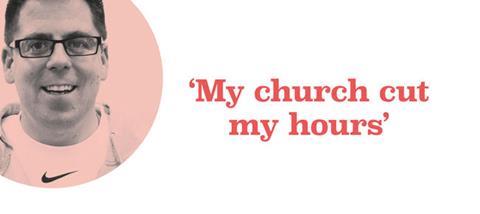At the start of summer 2011, if you had asked me, ‘How’s life?’ my response would have been, ‘Life is good.’ I had been the fulltime youth worker in my home church for almost 18 months. I had married a wonderful and supportive woman just over a year earlier and we were newly-weds creating a shared life together.

I felt as though in all aspects of my life I was committed to following God’s call and seeking to serve him obediently. I was, I believed, ministering in the context that I had been divinely chosen for and in a community where I had been deliberately placed. I had that sense of call. I could honestly conclude that life was good. God was good.
But the world was changing and facing economic challenges unlike any seen previously in my lifetime. Our church was approximately £70,000 in debt. A comprehensive spending review was conducted. I thought I was safe. I felt valued. The youth work placed me at the heart of the community. I was doing God’s mission. I was called. But I received a different kind of call – a telephone call from the church leadership asking me to attend a meeting. I sensed the conversation was going to be uncomfortable and, as my memory recalls it, it was. It went something like this: ‘We’ve reluctantly come to the conclusion that in order to reduce our financial deficit we need to save money as well as increase income. As part of this, we need to reduce your hours by a fifth.
My employers, my home church, were reducing my employed hours by 20 per cent. This role, in this place, that I felt clearly called to, was changing in a way that I had never anticipated. I was gutted. I was sad. I was hurt. I cried. I shouted. I complained. I prayed: it was a raw, gutsy, honest, sad, hurt, tearful, loud, disgruntled expression of all that I was thinking and feeling. It was some of the most powerful prayer time I have ever experienced. When the doubts that inevitably creep into our minds arrive, there is nothing more effective in countering those uncertainties than a firm sense of call. Had my calling changed because I was now being paid for fewer hours in which to exercise that calling? The answer to this question, I discerned was no. What had changed were the parameters for expressing that call.
I was grateful for friends outside the church who listened and understood without feeling the need to try and fix things. I was grateful for a wife who shared in my hurt and pain, yet never passed on her concerns to me in the form of burdens. I was thankful for colleagues, relieved that they had avoided any reduction in hours, but able to recognise the impact that this would have on me as a person and on the youth ministry. I was indebted to my diocesan youth advisor for the insight and wisdom they were able to provide and I was appreciative of the wisdom of friends I had made as a student youth worker with CYM. It was through the conversations with these people that God revealed a direction of travel that was beyond my imagination or comprehension and took me to a place where I am, at least in hindsight, able to be thankful.
In the two years since graduating from CYM in 2009, I had discovered that I missed the reflection and critical engagement that the course and conversation with other practitioners provided. I often said that I would love to study for an MA ‘in the future…’ In my full-time role, I incorrectly felt that time spent reading and investing in myself was wasted time. A few conversations later, my desire to study for an MA had been fully ignited as I wanted to ensure I didn’t simply work the same hours for less pay. I was encouraged and equipped to ensure that this ‘gift of time’ given by my employer could be put to full use. As is so typical in the church, a restricted fund designed for the ‘education of poor boys’ was uncovered and it was decided that at this time I could be considered ‘a poor boy’. The church actually funded two-thirds of the cost of my MA studies even though they were unable to pay my salary!
In October 2015, I graduated with a merit in a Masters in Leadership and Mission. As a result of the journey I have been on, I’ve come to understand myself, my calling and the way God works differently. I’ve grown, I’ve changed, but God hasn’t. God is faithful. So if you were to ask me today, ‘How’s life?’ I’d answer: ‘Life is good. God is good.’
Here are five things I learned during this challenging time:
Call
We must spend time prayerfully discerning our calling. It gives us the strength to protect ourselves when times are hard. A challenging time may refine the call but isn’t the ideal moment to define the call.
Honesty
God can handle us sharing how we feel with honesty and integrity. Often, we ourselves aren’t ready to own those feelings, but if we take them to God in prayer, he can hold them.
Support
Don’t be afraid to seek support. You’ll find it in all sorts of places, both where you anticipate it and from some unexpected sources. The thoughtful prayers and friendship of others can often reveal directions of travel that we would not have uncovered ourselves.
Gratitude
When we face challenges, it is easier to focus on the challenge, rather than the many blessings we do have. By consciously seeking to be grateful and gracious, we change our reaction to the situation.
Hope
There is always hope. There is always more. If we allow God to speak into our lives, with all its uncertainties, frustrations and fears we will find light in our darkness.





































